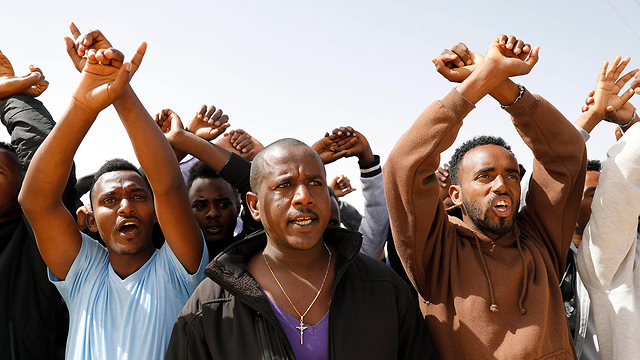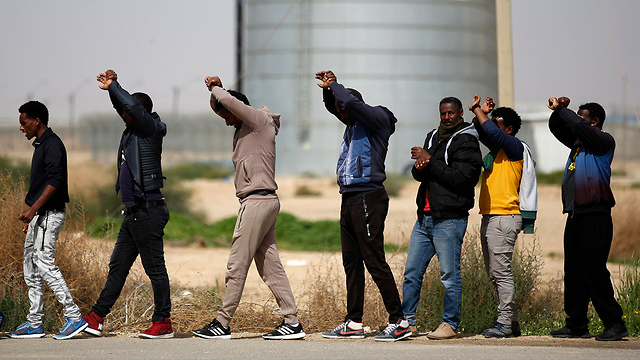

State to release 58 asylum seekers ahead of expulsion decision
58 asylum seekers who have refused deportation to Rwanda will be released from Saharonim facility Wednesday evening; decision on remaining 212, who also refused, to be reached Thursday by AG Mandelblit; special envoy sent to third country—ostensibly Rwanda—to examine possibility of new agreement for forced expulsion.
The state has announced that 58 of the 270 asylum seekers detained in the Saharonim detention facility in the Negev will be released Wednesday evening. The migrants have all been previously offered "willing deportation" to Rwanda, but refused.
In addition, the remaining 212 asylum seekers have also been offered to willingly leave to Rwanda, but they have all refused as well. According to the original deportation plan, their refusal meant they will be incarcerated indefinitely, but since the possibility of deportation to Uganda is still on the table, they will remain in Saharonim.
The remaining asylum seekers offered expulsion to Rwanda and refusing it will remain in custody until Attorney General Avichai Mandelblit decides their fate. Mandelblit's decision is expected to be made Thursday at noon.
Earlier Wednesday, the state submitted its response to the High Court regarding a petition seeking to secure the release of asylum seekers detained at the Saharonim facility.
The state declared in its reply that an Israeli envoy left to one of the countries with which an expulsion agreement was signed—apparently Uganda—and is expected to communicate whether the agreement was still in force.
"In light of claims made against the second third country recently, and focusing the expulsion to that country and it alone, several factual updates must be received—including by the special envoy to third countries entrusted with the matter," the state's response said.
"Pursuant to this logic, an emissary left to the aforementioned second third country (Wednesday) morning and is expected to deliver answers and updates on the evening of the same day, or Thursday morning at the latest," the statement concluded.
Mandelblit, for his part, is expected to make his ruling by Thursday at noon and to announce whether the asylum seekers still detained can be released. "If the attorney general is not convicted he has everything necessary to begin involuntary expulsion to the second third country, detainees will be released from custody," the state elucidated.
In effect, then, the envoy will examine the possibility of forcefully expelling migrants to the third country after a first agreement with said country collapsed.
Difficulties arise after annulment of UN agreement
With Prime Minister Benjamin Netanyahu reneging on a deal with the United Nations (UN) to resolve the asylum seeker issue, a source close to the matter said Tuesday, "Not only did Netanyahu go back on an excellent agreement, which should've solved Israel's problem vis-à-vis half of the work migrants, he actually admitted Israel is having a hard time offering legal solutions that would be in line with High Court of Justice rulings."
"Now he's placing the responsibility for this upon the High Court's shoulders again, without having good, effective and legal answers himself."
It was further reported Tuesday that the prime minister has been considering bringing a bill proposal to the government's approval that would bypass the High Court's ruling. One of the options on the table is including a "cessation clause," which would allow the Knesset to pass a law that cannot be annulled by the High Court.
But political sources say the prime minister has not yet made up his mind on the matter.
Different government bodies dealing with the issue—the National Security Council and the ministries of interior, public security and justice—held consultations on Monday in an effort to create a new, legal outline to resolve the problem, which will be presented to the High Court.
Inside officials stressed the problem has now been exacerbated. Primarily, Israel would have to reexamine the legality of detaining asylum seekers at the Saharonim facility.
They were imprisoned to begin with under the assumption this would be a temporary measure until their eventual deportation. But now, with no concrete solution on the horizon, it is unclear whether asylum seekers can still be legally held in Saharonim.



















